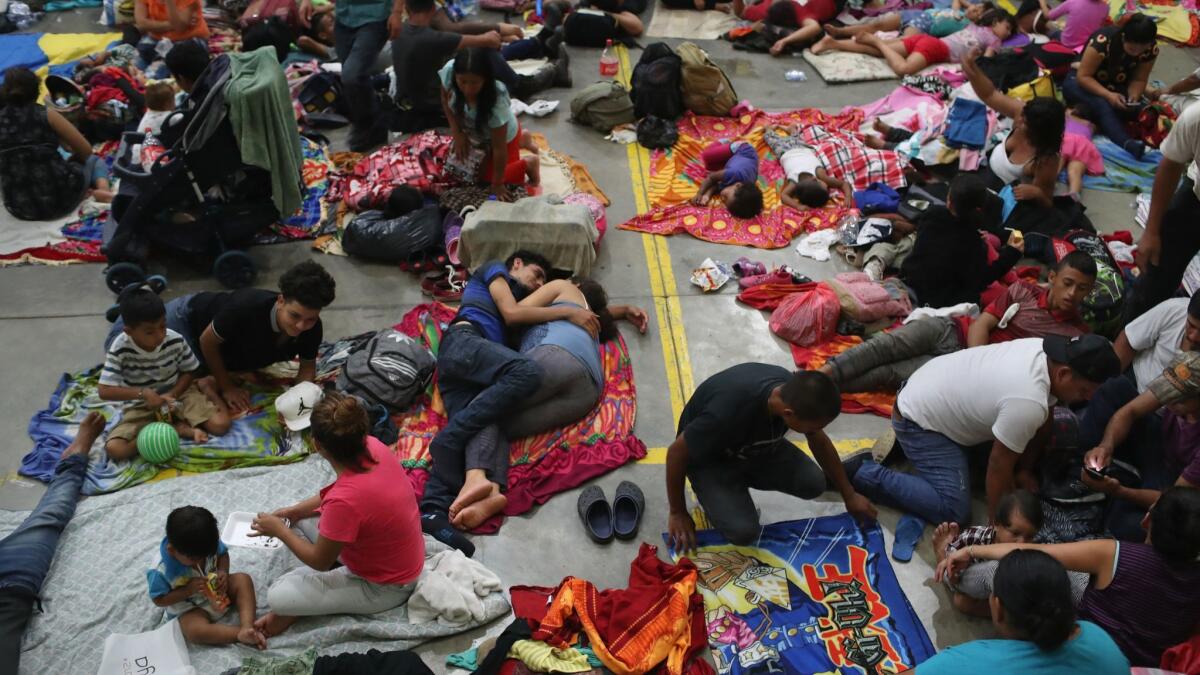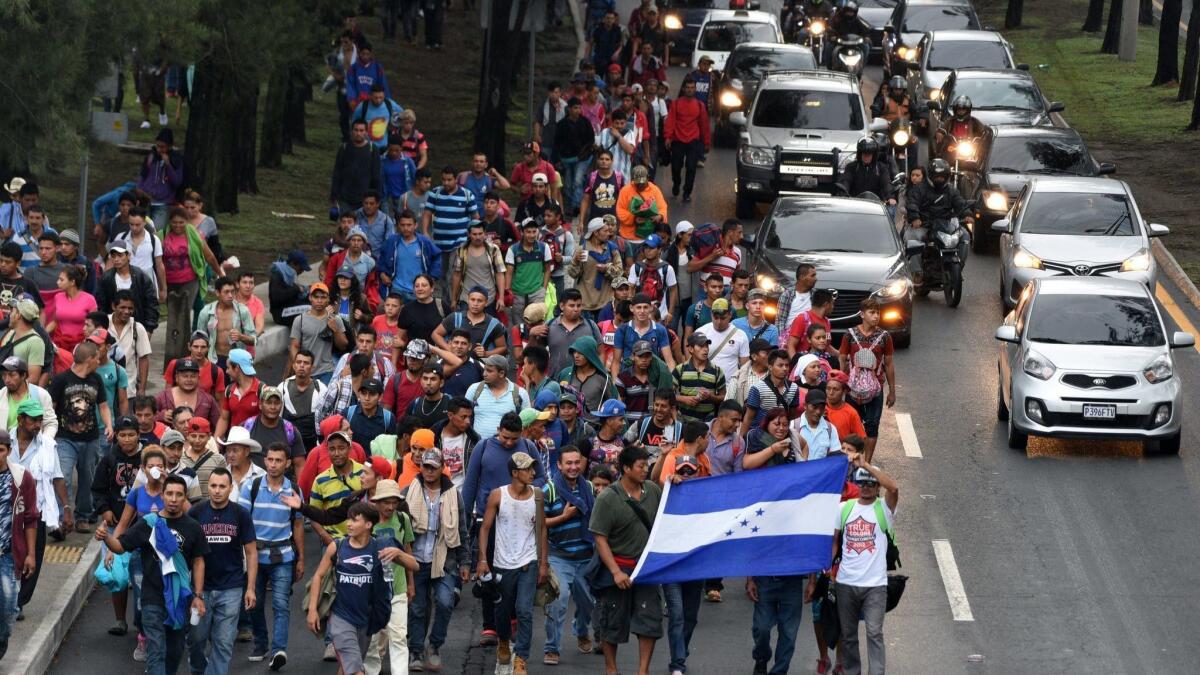Trump threatens to send troops to the border and cancel trade deal to stop migrant caravan

- Share via
Reporting from Guatemala City — President Trump threatened Thursday to scrap a crucial trade deal and send troops to the U.S. southern border in response to a large caravan of Central American immigrants heading toward the United States.
In a series of tweets, Trump said that if Mexico is incapable of stopping the immigrants, he will “call up the U.S. Military and CLOSE OUR SOUTHERN BORDER!”
Trump also threatened to cancel a pending trade deal with Mexico that took more than a year to negotiate and is designed to replace the North American Free Trade Agreement.
“The assault on our country at our Southern Border, including the Criminal elements and DRUGS pouring in, is far more important to me, as President, than Trade or the USMCA,” Trump said, referring to the United States-Mexico-Canada Agreement.
His threats came as an estimated 1,500 members of the loosely organized caravan reached the Mexico-Guatemala border, with thousands more expected to arrive in the coming days. Mexican authorities have closed a border crossing near the town of Tapachula, and have ordered hundreds of federal forces to the area to help immigration agents guard popular illegal crossing points along the murky Suchiate River, which forms the international boundary between the two countries.
Dozens of federal police officers stood guard on the Mexican side of the river on Thursday. It was unclear whether the immigrants would try to rush the border, as they did at the Honduras-Guatemala border several days ago, or whether they plan to turn themselves in to border authorities with the hope that they will be granted entry. The immigrants appeared ready to wait for the rest of the caravan to arrive in order to proceed together.
Mexican authorities have said that members of the caravan will be treated like anybody else seeking to enter Mexican territory: Those with proper documentation will be allowed to pass while anybody entering the country “in an irregular manner” will be apprehended and returned to their home country.
Immigrants fleeing violence or other threats who seek refugee status to stay in Mexico will have to request it at the border and wait up to 45 days in immigration detention.
The Mexican government said Thursday that it plans to ask the United Nations Refugee Agency, which has offices near the Mexico-Guatemala border, to help it process possible refugee applicants and “contribute to a humanitarian solution.”
Trump’s demands sparked widespread anger in Mexico, with some complaining that it was a violation of Mexican sovereignty.
Mexico “should not do Trump’s dirty work,” tweeted filmmaker and activist Epigmenio Ibarra, who called for the free transit of the caravan through Mexico. Political scientist Genaro Lozano said on Twitter that Trump’s pressure on Mexico “is terrible and unacceptable.”
In a radio interview, Mexican Foreign Secretary Luis Videgaray said Trump’s tweets were “clearly politically motivated” and designed to generate support for Republican candidates before the midterm elections next month.
“They are aimed at his electorate,” Videgaray said. “Rather than reacting, we have to put the tweets in context and not give them greater importance …we already have a lot of experience in expressions like this.”
The last time a similar caravan of immigrants sought to cross into Mexico, in April, authorities gave participants short-term visas that allowed them to travel through Mexico and reach the United States border. Many of those immigrants said they intended to seek asylum in the U.S., and Mexican officials said that international law gave them the right to do so. Mexico’s actions at the time angered Trump, who ordered National Guard troops to the U.S. southern border.
Trump did not elaborate on his threats to send soldiers to the border on Thursday. Federal law bars the military from conducting law enforcement activities on U.S. soil, although National Guard troops have been used at the border in limited capacity by Trump and under previous administrations, including in 2006 and 2010 under former presidents George W. Bush and Barack Obama.
Along with his warning that he is ready to engage the military, Trump has also threatened to withdraw aid from Mexico and the so-called Northern Triangle countries of Honduras, El Salvador and Guatemala if the caravan is not stopped.
The caravan, which includes people fleeing violence and political oppression as well as migrants in search of work, departed from the Honduran city of San Pedro Sula on Saturday, crossed into Guatemala on Monday, and has continued to swell in size in the days since.
Many immigrants said they rushed to join the caravan after seeing it covered by news outlets last week. Like previous caravans, this one was designed to help protect immigrants from the dangers of the migrant trail, which include robbery, rape and assault. Many participants said it seemed safer and cheaper than hiring a smuggler.

Father Mauro Verzelleti, the director of the Casa del Migrante in Guatemala City, said that in the last day and a half, about 5,000 immigrants mostly from Honduras arrived at his shelter. He opened emergency shelters in nearby elementary schools, but said that hundreds of people were still forced to camp in the street Wednesday night.
Verzelleti called on Central American countries to buck Trump’s demands to halt the caravan.
“Migration is a fundamental right, and states must respect this right,” Verzelleti said. He pointed to the United States’ long history of political intervention in Central America, including its support for right-wing President Juan Orlando Hernandez, who many Hondurans think rigged last year’s presidential election.
“If countries do not implement politics that permit people to remain in their countries, then they must respect the right to migrate,” Verzelleti said.
Most of the migrants who slept at the shelter set out Thursday morning for the seven-hour journey to the Mexican border, with many hitching rides in cars or on the backs of tractor trailers. Many Guatemalans expressed support for the immigrants, giving them food, clothing or small amounts of cash.
One of those heading north was Francisco Ponce, a former motorcycle taxi driver from western Honduras who said he was forced to stop working eight months ago because he couldn’t afford the extortion taxes levied by local gangs.
“I was not able to work,” he said. Heading for the United States is the only way to provide for his three daughters and wife, he said.
We hope that God touches Trump’s heart. He is human just like us. We are not going to the U.S. to hurt anyone, but in order to work to support our families.
— Francisco Ponce, migrant from Honduras
Ponce said he was not daunted by Trump’s threats to deploy the military to the U.S. border, and has hope that God will intercede.
“We are not afraid,” he said. “We hope that God touches Trump’s heart. He is human just like us. We are not going to the U.S. to hurt anyone, but in order to work to support our families.”
Other immigrants admitted that they were wary of what lay ahead.
“Who knows what will happen,” said German Ramirez, a farmer from Honduras. “We will see.”
Secretary of State Michael R. Pompeo will visit Mexico City on Friday to discuss the caravan with Mexican President Enrique Peña Nieto. Last week, U.S. Vice President Mike Pence hosted the leaders of the Northern Triangle countries at a conference on immigration where he implored them to persuade their citizens to stay home.
Those efforts and others come as record numbers of families have sought to enter the United States, even though the overall number of people crossing the border is much lower than in previous years. A previous administration effort to curb immigration, Trump’s “zero tolerance” policy, called for the criminal prosecution of all people who illegally enter the U.S. and drew controversy after it resulted in the separation of thousands of children from their parents.
Jason Marczak, a Latin America expert at the Atlantic Council think tank, said the American response to the caravan must focus on “the push factors that force people to leave to begin with,” including high levels of poverty, corruption and violence.
“A strong border will not prevent people from leaving their communities when their lives are threatened,” Marczak said.
Linthicum reported from Mexico City, and special correspondent Jeff Abbott reported from Guatemala City. Cecilia Sánchez in The Times’ Mexico City bureau contributed to this report.
Twitter: @katelinthicum
UPDATES:
4:10 p.m.: This article was updated with reporting from Honduras and addition reaction from Mexico.
This article was originally pubished at 10:40 a.m.
More to Read
Sign up for Essential California
The most important California stories and recommendations in your inbox every morning.
You may occasionally receive promotional content from the Los Angeles Times.











